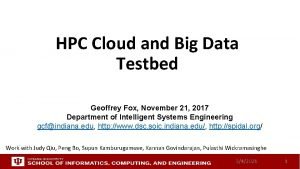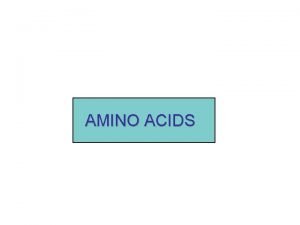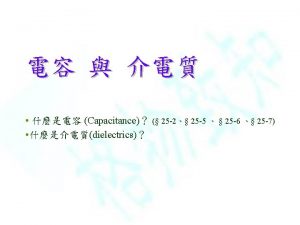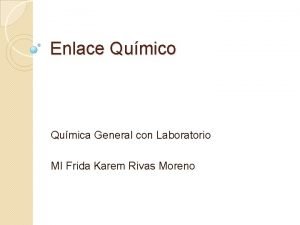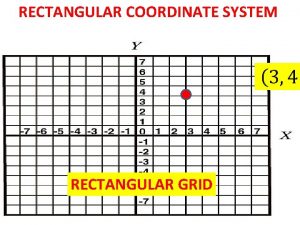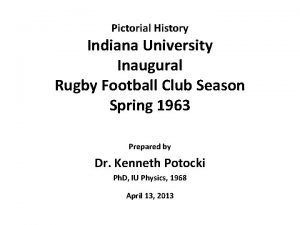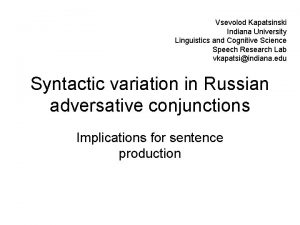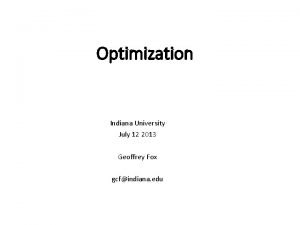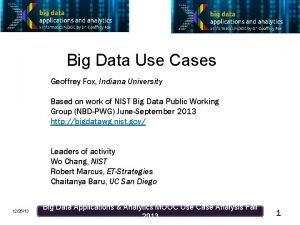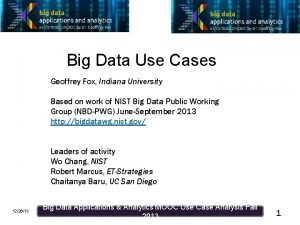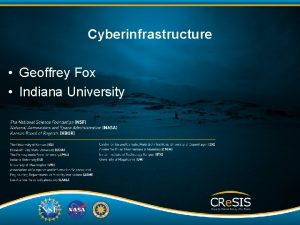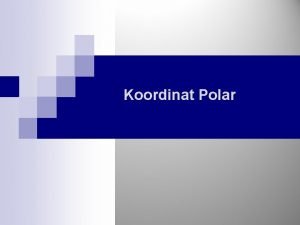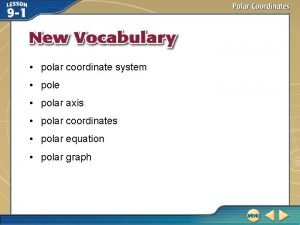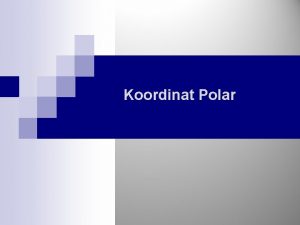Polar Grid Geoffrey Fox PI Indiana University Associate












- Slides: 12

Polar. Grid Geoffrey Fox (PI) Indiana University Associate Dean for Graduate Studies and Research, School of Informatics and Computing, Indiana University – Bloomington Director of Digital Science Center of the Pervasive Technology Institute Linda Hayden (co-PI) ECSU 1 of 12

What is Cyberinfrastructure? • Cyberinfrastructure is infrastructure that supports distributed research and learning (e-Science, e-Research, e-Education or digital science at Indiana University) • Links data, people and computers • Exploits Internet technology (Web 2. 0 and Clouds) adding (via Grid technology) management, security, supercomputers etc. • It has two aspects: parallel – low latency (microseconds) between nodes and distributed – highish latency (milliseconds) between nodes • Parallel needed to get high performance on individual large simulations, data analysis etc. ; must decompose problem • Distributed aspect integrates already distinct components (data) • Integrate with Tera. Grid (and Open Science Grid) 2 of 12

Support CRe. SIS with Cyberinfrastructure • Cyberinfrastructure is distributed hardware and software supporting collaborative science • Base and Field Camps for Arctic and Antarctic expeditions • Training and education resources at ECSU • Collaboration Technology at ECSU • Lower-48 System at Indiana University and ECSU to support off line data analysis and large scale simulations installed and currently being tested (total ~ 20 TF) • CRe. SIS analysis suitable for clouds 3 of 12

Indiana University Cyberinfrastructure Experience • Indiana University PTI team is a partnership between a research group (Community Grids Laboratory led by Fox) and the University IT Research Technologies (UITS-RT led by Stewart) • This allows us robust systems support from expeditions to lower 48 systems with use of leading edge technologies • Polar. Grid would not have succeeded without this collaboration • IU runs Internet 2/NLR Network Operations Center http: //globalnoc. iu. edu/ • IU is a member of Tera. Grid and Open Science Grid • IU leads Future. Grid – NSF facility to support testing of new systems and application software – Fox PI • IU has provided Cyberinfrastructure for LEAD (Tornado forecasting), Quake. Sim (Earthquakes), Sensor Grids for Air Force in areas with some overlap with CRe. SIS requirements 4 of 12

5

Polar. Grid goes to Greenland 6

NEEM 2008 Base Station 7

Polar. Grid Greenland 2008 • Base System (Ilulissat Airborne Radar) – – – • 8 U, 64 core cluster, 48 TB external fibre-channel array Laptops (one off processing and image manipulation) 2 TB My. Book tertiary storage Total data acquisition 12 TB (plus 2 back up copies) Satellite transceiver available if needed, but used wired network at airport used for sending data back to IU Base System (NEEM Surface Radar, Remote Deployment) – – 2 U, 8 core system utilizing internal hard drives hot swap for data backup 4. 5 TB total data acquisition (plus 2 backup copies) Satellite transceiver used for sending data back to IU Laptops (one off processing and image manipulation) 8 of 12

Polar. Grid Summary 2008 -2010 • • Supported several expeditions starting July 2008 Ilulissat: airborne radar NEEM: ground-based radar, remote deployment Thwaites: ground-based radar Punta Arenas/Byrd Camp: airborne radar Thule/Kangerlussuaq: airborne radar IU-funded Sys-Admin support in the field – – – 1 admin Greenland NEEM 2008 1 admin Greenland 2009 (March 2009) 1 admin Antarctica 2009/2010 (Nov 09 – Feb 2010) 1 admin Greenland Thule March 2010 1 admin Greenland Kangerlussuaq-Thule April 2010 9 of 12

Polar. Grid Summary 2008 -2010 • Expedition Cyberinfrastructure simplified after initial experiences as power/mobility more important than ability to do sophisticated analysis. • Smaller system footprint and data management has driven cost per system down. • Complex storage environments are not practical in a mobile data processing environment • Pre-processing data in the field has allowed validation of data acquisition during collection phases • Offline analysis partially done on Polar. Grid system at Indiana University 10 of 12

ECSU and Polar. Grid • Initially a 64 -core cluster, allowing near real-time analysis of radar data by the polar field teams. – Factor of 10 larger system being tested at IU and will be installed at ECSU • An educational videoconferencing Grid to support educational activities • Polar. Grid Laboratory for students • ECSU supports Polar. Grid Cyberinfrastructure in the field Assistant Professor, Eric Akers, and graduate student, Je’aime Powell, from ECSU travel to Greenland 2008 11 0 f 12

Possible Future CRe. SIS Contributions • • • Base and Field Camps for Arctic and Antarctic expeditions Initial data analysis to monitor experimental equipment Training and education resources Computer labs; Cyberlearning/collaboration Full off-line analysis of data on “lower 48” systems exploiting Polar. Grid, Indiana University (archival and dynamic storage), Tera. Grid • Data management, metadata support and long term data repositories • Parallel (multicore/cluster) versions of simulation and data analysis codes • Portals for ease of use 12 of 12
 Geoffrey fox
Geoffrey fox Polar vs nonpolar
Polar vs nonpolar Enlace polar
Enlace polar Polar and non polar amino acids
Polar and non polar amino acids Polar attraction
Polar attraction Difference between polar and nonpolar dielectrics
Difference between polar and nonpolar dielectrics Polar y no polar
Polar y no polar Polar coordinate grid
Polar coordinate grid Lga vs pga
Lga vs pga Indiana university intensive english program
Indiana university intensive english program Indiana university rugby
Indiana university rugby Indiana university cognitive science
Indiana university cognitive science Job framework iu
Job framework iu
